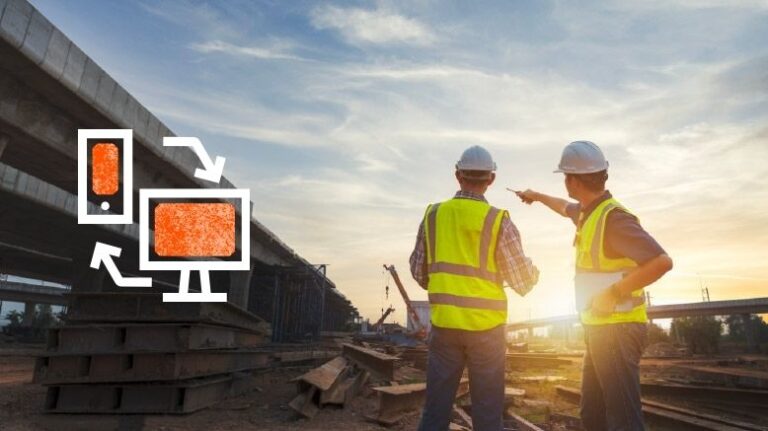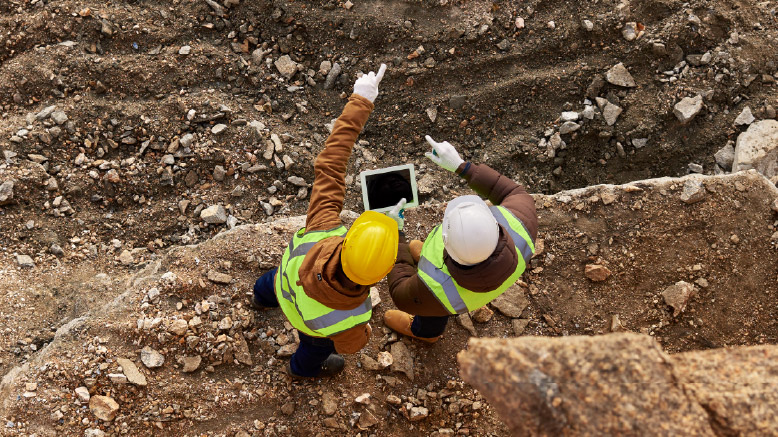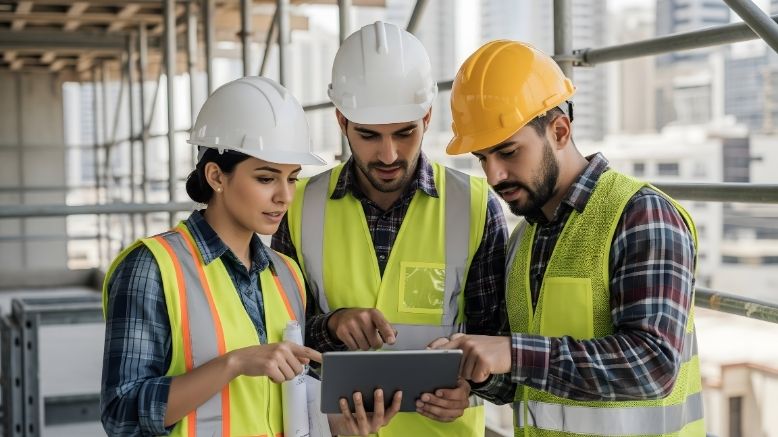— 5 min read
Redefining Tech Readiness for Civil Construction’s Future


Last Updated Sep 23, 2025

Israel Simmons
Civil & Infrastructure Solutions Specialist
11 articles
Israel Simmons, DBIA, CCM, PMP is a seasoned construction leader with over 12 years of experience delivering more than $3 billion in complex civil and infrastructure projects across the United States. His portfolio spans major freeway and bridge programs, rail and transit, wastewater treatment facilities, aviation, and other critical infrastructure. He holds a bachelor’s degree in Construction Management with minors in Business Administration and Communications from Drexel University and brings a practitioner’s perspective shaped by work across both owners and contractors. Israel joined Procore to help transform the construction industry through a unified, integrated platform that streamlines project execution from concept through delivery. He is deeply passionate about the development of the built environment, the physical and digital tools that enable it, and the human dynamics that ultimately make it successful.

Marlissa Collier
34 articles
Marlissa Collier is a journalist whose work focuses on the intersections of business, technology, policy and culture. Her work has been featured in digital and print formats with publications such as the Dallas Weekly, XO Necole, NBCU Comcast, the Dallas Nomad, CNBC, Word in Black and Dallas Free Press. Marlissa holds an undergraduate degree in Construction Engineering from California State University, Long Beach and an MBA from Southern Methodist University’s Cox School of Business.
Last Updated Sep 23, 2025

“Tech readiness" has become a civil construction industry buzzphrase, used to describe the firm of the future. While some believe being “tech ready” simply means acquiring the latest LLMs, drones, sophisticated software, or advanced machinery, and these gadgets are certainly part of the equation — true tech readiness runs far deeper.
True tech readiness is about cultivating an organizational ecosystem where technology can truly thrive, encompassing unwavering executive buy-in, the right and robust infrastructure, a culture of lifelong learning and a well-trained and empowered workforce. Without these foundational pillars, even the most cutting-edge tools risk becoming underutilized assets, failing to deliver on transformative potential.
Table of contents
Leadership at the Helm: The Power of Executive Buy-In
The journey to genuine tech readiness begins at the very top: with executive leadership. When a CEO or a high-level executive is seen actively engaging with new technologies, it sends a powerful message throughout the organization that innovation and learning are cultural staples.
Tech readiness is definitely more than just having the widgets. It's about executive buy-in, strategic alignment at the top, where they say, 'Hey, we understand that tech is here to stay, and it's the future.'

Israel Simmons
Civil & Infrastructure Solutions Specialist
Procore Technologies
But this isn't about setting a mandate: Rather, it’s about leading by example.
Imagine a CEO who plays around in a brand new BIM platform, publicly figuring things out themselves. This kind of demonstration can be seen as a genuine investment in the industry's future, inspiring staff to embrace and explore new and potentially vital tools with confidence.
Though conversely, leaders who remain "too far removed" from the technological pulse of their operations risk fostering a culture of apathy or resistance, where employees lack the agency and encouragement to truly leverage innovative tools.
Building the Digital Backbone: The Role of Robust Infrastructure
Beyond leadership vision and outward encouragement for adoption, a robust infrastructure forms the essential backbone for any technological implementation. The silent workhorse, if you will, that ensures data flows seamlessly from a jobsite to the back office.
This means investing not just in cool new gadgets or advanced software licenses, but in the underlying hardware, connectivity and data management systems that allow your workforce to properly leverage said investments.
For a civil construction firm utilizing reality capture through drone surveys, for instance, the drone itself is just one piece.
But the true readiness lies in having the bandwidth and processing power to handle massive datasets, and a centralized system to store, analyze, visualize and finally disseminate that information effectively across project teams. Without this foundation, the valuable insights captured by cutting-edge tools can become isolated, preventing holistic project oversight and integrated workflows.
Before you have the technology in place, you've got to have the infrastructure in place. We're talking about IT systems, networking capabilities — if you don't have those internally, you're not ready.
Israel Simmons
Civil & Infrastructure Solutions Specialist
Procore Technologies
Empowering the Workforce: Knowledge and Continuous Learning
Finally — and perhaps most importantly — true tech readiness hinges on a knowledgeable, continuously learning and empowered workforce. It's not enough to deploy new software; employees must be equipped with the skills and understanding to use it effectively.
Employees should also be comfortable trying new approaches, affirmed by company culture that it’s okay to try and potentially fail fast and forward. This addresses the inherent human element of change. For many in civil construction, especially those in craft roles, the shift from traditional, hands-on methods to digital processes can feel daunting with many worried about technology adoption leading to technology replacement.
It's about having the knowledge base to align corporate initiatives and to actually execute...You need staff with that knowledge or a clear path to educate them.
Israel Simmons
Civil & Infrastructure Solutions Specialist
Procore Technologies
Now, more than ever, comprehensive training programs, mentorship and a culture that encourages curiosity and experimentation are vital.
Companies like Bechtel have established internal "Centers of Excellence"for data and analytics and offer internships focused on AI and robotics, demonstrating a commitment to building this important human capital. This not only upskills the current workforce but also attracts younger, tech-savvy talent to an industry that is actively modernizing.
The Return on Readiness: Benefits of a Holistic Approach
The benefits of a holistic approach to tech readiness are profound. Beyond simply saving money, genuine tech readiness can lead to improved project efficiency, better quality outcomes and enhanced safety.
For example, optimizing the preconstruction phase with 3D modeling and sequencing tools can allow for a virtual rehearsal of daily operations, catching potential clashes and inefficiencies long before ground is broken. Leveraged correctly, this translates to fewer costly errors and rework.
Not to mention, recent data has shown a tech-ready organization can create better employee retention by creating more efficient processes that lead to improved work-life balance.
When employees aren't bogged down by manual, repetitive tasks, they're more engaged and less likely to seek opportunities elsewhere. This retention of expertise, in turn, fuels increased innovation and ultimately leads to improved margins and competitiveness.
Charting the Course Forward
Overcoming the hurdles, particularly initial investment costs and resistance to change, requires a strategic mindset. A willingness to invest upfront for long-term gains and understanding that the traditional "short-term minded" approach is no longer sustainable in a rapidly evolving industry is key.
In essence, true tech readiness in civil construction is about building a digitally intelligent organization, not just buying digital tools. It's a strategic, holistic approach that begins with leadership vision, permeates through robust infrastructure and continuous learning and culminates in a workforce empowered to innovate and build the infrastructure of tomorrow.
Free AI in Construction Course with Hugh Seaton
Start learning today with industry expert Hugh Seaton and discover how AI can boost efficiency, reduce risk, and transform your projects.

Was this article helpful?
Thank you for your submission.
0%
0%
You voted that this article was . Was this a mistake? If so, change your vote
Scroll less, learn more about construction.
Subscribe to The Blueprint, Procore’s construction newsletter, to get content from industry experts delivered straight to your inbox.
By clicking this button, you agree to our Privacy Notice and Terms of Service.
Thank you!
You’re signed up to receive The Blueprint newsletter from Procore. You can unsubscribe at any time.
Categories:
Written by

Israel Simmons
Civil & Infrastructure Solutions Specialist | Procore Technologies
11 articles
Israel Simmons, DBIA, CCM, PMP is a seasoned construction leader with over 12 years of experience delivering more than $3 billion in complex civil and infrastructure projects across the United States. His portfolio spans major freeway and bridge programs, rail and transit, wastewater treatment facilities, aviation, and other critical infrastructure. He holds a bachelor’s degree in Construction Management with minors in Business Administration and Communications from Drexel University and brings a practitioner’s perspective shaped by work across both owners and contractors. Israel joined Procore to help transform the construction industry through a unified, integrated platform that streamlines project execution from concept through delivery. He is deeply passionate about the development of the built environment, the physical and digital tools that enable it, and the human dynamics that ultimately make it successful.
View profile
Marlissa Collier
34 articles
Marlissa Collier is a journalist whose work focuses on the intersections of business, technology, policy and culture. Her work has been featured in digital and print formats with publications such as the Dallas Weekly, XO Necole, NBCU Comcast, the Dallas Nomad, CNBC, Word in Black and Dallas Free Press. Marlissa holds an undergraduate degree in Construction Engineering from California State University, Long Beach and an MBA from Southern Methodist University’s Cox School of Business.
View profileExplore more helpful resources

Why do most construction strategies fail (and how to fix them)?
In this episode of The Power of Construction, hosts Sasha Reed and Brett King sit down with Helen Gawor to challenge construction’s approach to strategy. Helen reveals why most strategies...

Building a Culture of True Tech Readiness in Civil Construction
While significant investments are pouring into revitalizing the nation’s infrastructure, the true capacity to capitalize on this opportunity hinges on more than just funding — it relies on a fundamental...

6 Tips to Turn Construction Culture Into Daily Practice
Every construction company has a culture. Whether it’s intentional or not. The difference lies in how that culture shows up on the job. In the first article of this series on...

Turning Values into Workflows: How a GC Firm Operationalized Culture
Culture isn’t just about what companies believe — it’s about how those beliefs show up in day-to-day work. When culture is embedded into operations, it becomes something teams can rely...
Free Tools
Calculators
Use our calculators to estimate the cost of construction materials for your next project.
Templates
Find a template to help you with your construction project tasks.
Material Price Tracker
Get the latest U.S. retail prices and view historical trends for common building materials.
Glossary
Explore key terms and phrases used in the industry.
